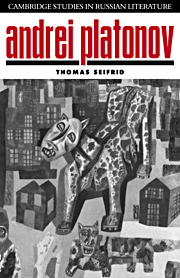Book contents
- Frontmatter
- Contents
- Preface
- List of abbreviations
- Introduction: The problem of reading Platonov
- 1 Consciousness and matter: Platonov in Voronezh and Tambov (1917–1926)
- 2 Learning the language of being (1926–1927)
- 3 Chevengur and the utopian genre
- 4 Platonov and the culture of the Five-Year Plan (1929–1931)
- 5 “Socialist Realist” Platonov (1934–1951)
- Conclusion
- Notes
- Select bibliography
- Index
- CAMBRIDGE STUDIES IN RUSSIAN LITERATURE
4 - Platonov and the culture of the Five-Year Plan (1929–1931)
Published online by Cambridge University Press: 27 August 2009
- Frontmatter
- Contents
- Preface
- List of abbreviations
- Introduction: The problem of reading Platonov
- 1 Consciousness and matter: Platonov in Voronezh and Tambov (1917–1926)
- 2 Learning the language of being (1926–1927)
- 3 Chevengur and the utopian genre
- 4 Platonov and the culture of the Five-Year Plan (1929–1931)
- 5 “Socialist Realist” Platonov (1934–1951)
- Conclusion
- Notes
- Select bibliography
- Index
- CAMBRIDGE STUDIES IN RUSSIAN LITERATURE
Summary
The years 1929–1931, which in Platonov's life mark the important interlude between the rejection of Chevengur and the vicious attack by Fadeev that made publication of his writing problematic for years to come, coincide almost exactly with the First Five-Year Plan and the associated dominance in literary affairs of the ultraleft Russian Association of Proletarian Writers (RAPP). These events are particularly significant because they denominate the first distinctly Stalinist period in the Soviet Union. In this period Platonov wrote a series of works that tend to be treated as satires but are better thought of as records of his ambivalent relation toward, and complex attempt to assimilate himself to, the culture of the Five-Year Plan.
Kotlovan (The Foundation Pit; 1930) is of coure the fullest, and most troubled, record of this encounter between Platonov's world view and Stalinism's culture, ideology, and language. But the shorter “satirical” works (“Gosudarstvennyi zhitel',” 1929; “Usomnivshiisia Makar,” 1929; “Vprok,” 1931) are important for what they reveal of the place that magnum opus occupies within the oeuvre as a whole. The ironic and even caricaturizing tendencies of these works set them at odds with the kind of literature advocated by RAPP; but Platonov's attitude toward Soviet power and its claims to be remaking proletarian existence had never been simple, and the satirical elements of these works have more to do with outlining the terms on which he was willing to endorse the Five-Year Plan's renewal of these claims than with any wholesale rejection of its campaign.
- Type
- Chapter
- Information
- Andrei PlatonovUncertainties of Spirit, pp. 132 - 175Publisher: Cambridge University PressPrint publication year: 1992

